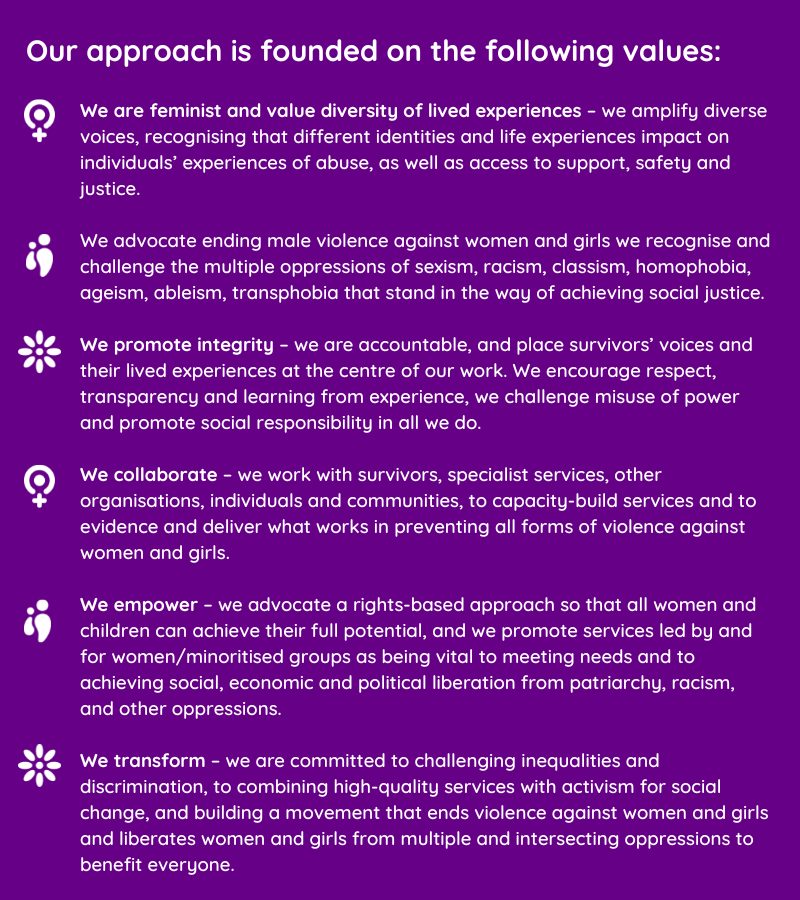What makes Welsh Women’s Aid an exciting, energetic and enjoyable place to work? It’s the people who work here. Throughout the organisation there is a passion and drive to make positive changes to the lives of women and children. Our relentless determination to succeed unites us and creates a unique working culture.
Core to this culture are our vision, mission and values:
-
The shared values and analysis of violence against women, and being a member of a national organisation that has the same analysis of the issues, is of the greatest value to us...
Local specialist service
Welsh Women’s Aid is a feminist organisation, our values are founded on commitments to human rights, anti-discrimination and freedom from oppression. We believe the evidence that violence against women, domestic abuse and sexual violence is based on gender inequality, a cause and consequence of the unequal position of women and girls in society, a violation of human rights, and is entirely preventable.

-
Professional, collaborative, open … I’ve had so much communication offering support in different areas, very friendly, open and helpful...
Local specialist service
How does WWA and our member services put our values into action?
Our values run through our recruitment processes, how we work with survivors and how we collaborate with other organisations. It means we are uncompromising when faced with challenging misuse of power or oppressive practices, it means we share expertise, we accept that we may not always get it right, and we are committed to learning and moving forward for the benefit of all survivors of abuse.
Our approach is informed by evidence that women and girls, and men and boys, experience and perpetrate violence and abuse differently. The sex and gender of victim and perpetrator influences the nature of the abuse, its severity, harm, and lethality. Women and girls, in particular, experience abuse in everyday lives at higher rates, and it is men across all groups that are more likely to perpetrate abuse against women, men and children.
Violence also happens in same-sex relationships and against trans people, and women also use violence. So, we are committed to anti-discriminatory practice and to achieving safety, support, protection and justice for all women and girls, men and boys, and for trans people. Our transgender policy commits to supporting the realisation of rights for trans people, and the delivery of trans inclusive services and support.
We support the evidence that women only spaces and services are important (Equality Act 2010), as well as the need for services designed, delivered and led ‘by and for’ women, Black and minoritised women and other groups.
These values and approach do not stop organisations in our federation employing men, supporting men and boys, or working with perpetrators. Providing services based on the needs of survivors, that are sensitive to sex, gender, ethnicity, culture, sexuality, age and ability is a vital component of specialist services, of effectively supporting survivors and intervening with perpetrators.
Unhelpful stereotypes of women and men are often the basis of violence against women and girls. These stereotypes are strengthened when they are combined with with sexism, racism, homophobia and other forms of discrimination and they are harmful to everyone.
We are committed to challenging, disrupting and changing social and cultural norms which accept and perpetuate violence against women and girls.
-
“The feminist perspective is critical to the long term vision to eradicate violence against women, nothing we do is outside that lens, and I want my national organisation to be as vocal and as steadfast in that, and we mustn’t lose that”
Local specialist service

